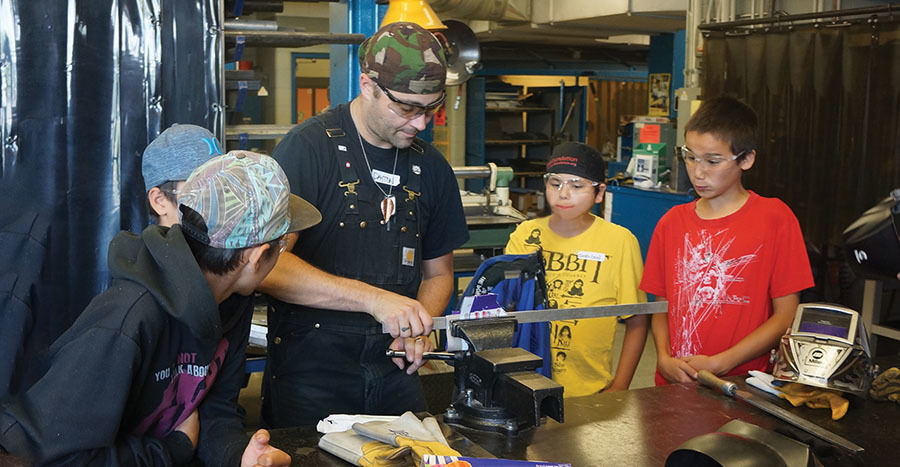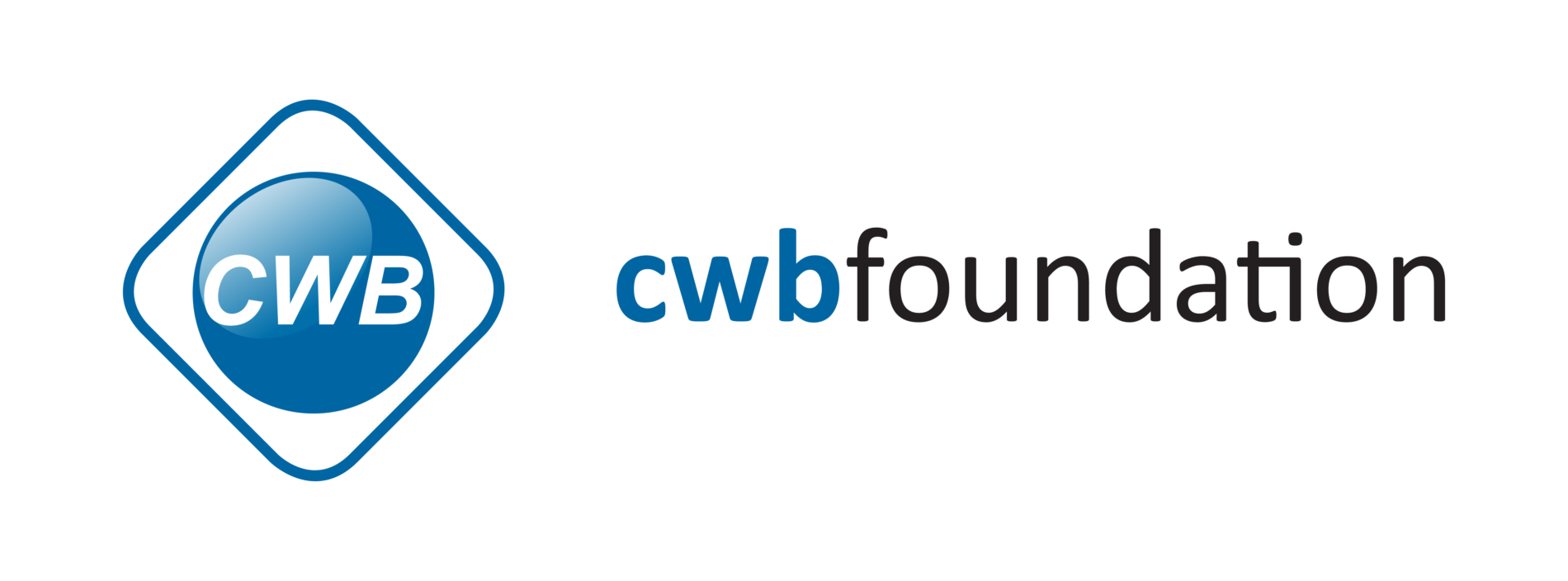
Jun 7, 2023
When Dayton Block first started partnering with the CWB Welding Foundation in 2013, he didn’t expect the relationship to blossom into a full-time position on the team ten years later. But the spark ignited early when Dayton became a key player in shaping what would become a flagship program for the Foundation, ultimately opening the doors for more programs to follow.
“When I was teaching welding at St. Joseph High School, of course, the budget was always an issue,” laughs Dayton. “We had a workshop and formed a lot of partnerships with foundations and local chapters who stepped up big time. Those partnerships went a long way in helping to organize programs like one we called Wicked Welding. I had this idea for a week-long summer youth camp that I wanted to call Mind Over Metal, where underprivileged kids could get hands-on welding experience in a safe and fun environment.”
Dayton knew that exposing underprivileged youth to skilled trades programs would give them something to think about as they progressed through high school. But the idea didn’t come together until he attended the CWB Group’s Educators Conference in 2013, where he met Deb Mates from the CWB Welding Foundation and Ken McKen from the Association. Deb, now past Executive Director of the CWB Welding Foundation, liked Dayton after realizing his dedication to teaching and advocating for the skilled trades. With Dayton eager to offer his time and passion for welding, Deb proposed hosting two pilot summer camps with $10,000 worth of funding, which Dayton says, “was like being given a blank cheque.”
“Ken and I created a solid plan for the camps, which, to be honest, was the easy part because headhunting participants ended up being harder than I thought. I literally posted flyers around the city because I didn’t know where else to go for the demographic we were targeting. I went to places like the YMCA, the Boys and Girls Club and the youth emergency shelter in search of these 12- to 15-year-old kids. I also contacted local Indigenous educators and school boards to wrangle up everyone we could.”
Dayton’s solicitation paid off as participants quickly began to sign up for both camps, maxing out at 20 participants each. To give everyone the best learning experience possible, Dayton recruited eight dual-credit students he had trained and trusted to act as volunteers with the goal of having one volunteer for every two camp participants. And finally, the day came to open the doors for the first camp.
Dayton knew that exposing underprivileged youth to skilled trades programs would give them something to think about as they progressed through high school. But the idea didn’t come together until he attended the CWB Group’s Educators Conference in 2013, where he met Deb Mates from the CWB Welding Foundation and Ken McKen from the Association. Deb, now past Executive Director of the CWB Welding Foundation, liked Dayton after realizing his dedication to teaching and advocating for the skilled trades. With Dayton eager to offer his time and passion for welding, Deb proposed hosting two pilot summer camps with $10,000 worth of funding, which Dayton says, “was like being given a blank cheque.”
“Ken and I created a solid plan for the camps, which, to be honest, was the easy part because headhunting participants ended up being harder than I thought. I literally posted flyers around the city because I didn’t know where else to go for the demographic we were targeting. I went to places like the YMCA, the Boys and Girls Club and the youth emergency shelter in search of these 12- to 15-year-old kids. I also contacted local Indigenous educators and school boards to wrangle up everyone we could.”
Dayton’s solicitation paid off as participants quickly began to sign up for both camps, maxing out at 20 participants each. To give everyone the best learning experience possible, Dayton recruited eight dual-credit students he had trained and trusted to act as volunteers with the goal of having one volunteer for every two camp participants. And finally, the day came to open the doors for the first camp.

“These camps started in August over a long weekend, and I remember because it was so hot,” says Dayton. “Remembering these camps makes me laugh because we were blindsided when parents and kids started showing up thinking it was an overnight camp since we didn’t communicate otherwise. I guess we could have welded some beds together on the first day to accommodate, but none of us were ready for a mass sleepover at the school.”
The response to the first two camps ended up being overwhelmingly positive. It may have started out slow, but Dayton and his volunteers saw quiet and reserved kids slowly form friendships throughout each program as they came out of their shells. The positive reinforcement participants received daily was a game-changer and did wonders for their confidence and success.
“Sadly, I felt like some of those kids were never told they were doing a good job at something,” says Dayton. “Giving them encouraging words built their confidence rather quickly during the program, and it was amazing to see it happen. By the end of it, kids were giving hugs and really bonding. One kid straight-faced asked me to adopt him, which made my bleeding heart ache.”
Most of the participants walked away from the camps filled with hope, letting the hosts know how much fun they had and how they now viewed welding as something they could see themselves doing as a career. Dayton says St. Joseph High School had a slight increase in enrollment the next semester because of the impression the Mind Over Metal camp, Dayton and the volunteers left on the kids.
Media caught wind of the camps while they were being delivered and inquired about shooting a story for the local news. After the story ran, Dayton received a call from a representative at Bob Dale Gloves, a Canadian manufacturer of hand protection and PPE.
“They thought what we were doing was awesome, and wanted to help. Bob Dale Gloves gave us tens of thousands of dollars’ worth of gloves and bought the program a spot on TV. I’m watching The Walking Dead one night, and a commercial for Mind Over Metal comes on. Needless to say, that got the message out, including to Trent Konrad on the CWB Education team, whom I formed a friendship with and years later brought me onto his team.”
With two camps under his belt, Dayton continued running camps on a yearly basis as both he and the Foundation worked on refining the program so it could be packaged and rolled out to other willing hosts. Hosting the pilot camps at a school workshop with proper equipment, like welding machines and plasma cutters, went a long way in helping them design the initial programs to be safe and informative for participants. However, creating a curriculum that other educators could duplicate required close consideration since not all schools have access to the same resources.

“One of my biggest concerns early on was ensuring the experience was consistent and safe across the board. I wanted to set the bar high, but we didn’t know who had what equipment and the skill levels of the educators and volunteers. I pictured 12-year-olds running around with oxyacetylene torches setting everyone on fire or worse. We needed to keep the program requirements basic and attainable.”
Dayton admits that packaging the program was a learning curve but found that keeping everything simple helped him and the Foundation realize that an application process needed to be involved. As he puts it, “We knew the material, machine and shop requirements, and if you wanted to host this camp, you needed to meet them.”
In the years following, the Mind Over Metal program has taken shape and continues to grow its impact with youth and communities across Canada. Since 2013, over 200 camps have been delivered across Canada and have given nearly 4,500 young participants something to think about as they look toward their futures.
And a decade after the initial pilot, Dayton became a full-time Foundation team member at the beginning of 2023, bringing his journey full circle. Coincidentally, the Foundation is also celebrating its 10th anniversary and is using this time to not only reflect on how far these camps have come and how instrumental they have been to its success as a national charity, but also looking to where they’ll go next.
“The Mind Over Metal camps have come a long way,” says Dayton, who has 12 Mind Over Metal camps under his belt. “Now that I’m part of the Foundation team, I see tracking sheets, Excel documents, processes and think, ‘Wow, they nailed it.’ I used to have a folder with everything on my desk, and I had to figure out what I wanted to do. I still see some of the groundwork I did build in our current program occasionally, even after all these years. The Mind Over Metal camps have grown to be such an impactful and inspiring program over the years and I’m excited to see how it grows in the next decade.”
